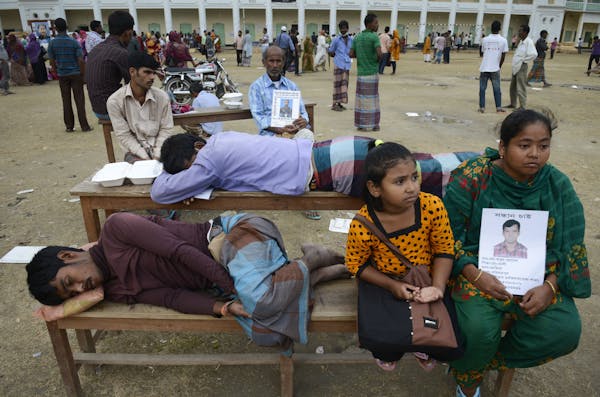The 1911 fire that swept through the Triangle Shirtwaist factory in New York, killing 146 people, was the catalyst for big improvements in industrial working conditions in America. The April 24 collapse of Rana Plaza, an eight-story complex of clothing factories near Dhaka, Bangladesh, was far deadlier, killing at least 650.
Although the tragedy has led to calls for safer factories in Bangladesh and other developing countries, it is far from certain that this will happen.
After the New York fire, protests by trade unionists led to new laws being passed and enforced. Factory owners and their customers took the higher costs on the chin, because in those less-globalized times there was nowhere else for them to go.
Things are more complicated in Bangladesh. Its trade unions are suppressed more aggressively than they ever were in America. It already has building regulations that should have prevented the collapse, but they were not enforced. Two dozen factory owners are members of parliament. The factories' foreign customers have plenty of other low-cost countries to which they could switch their work.
Some well-known U.S. firms are said to be contemplating doing exactly that — not because they fear that higher standards in Bangladeshi factories will raise costs, but because they fear that another tragedy would damage their reputations. The factory collapse came less than six months after a fire at another clothing factory near Dhaka killed 117 people.
So far, however, most of the big global clothing brands and retailers seem likely to stay in Bangladesh, to try harder to improve safety in their contractors' factories and to build goodwill among locals. Primark, a low-cost British retailer, and Loblaw — the Canadian owner of the Joe Fresh brand, whose wares have been found in the rubble — both have agreed to pay compensation to victims and their families.
Even before the latest disaster, some foreign retailers had taken steps to raise standards. Last October Gap Inc. announced a fire-safety action plan, which would include helping factory owners to pay for improvements. On April 9 Wal-Mart, some of whose products were found in the ashes of last year's factory fire, gave $1.6 million to the Institute of Sustainable Communities, a nongovernmental organization, to help it set up a health-and-safety academy in Bangladesh. Wal-Mart also recently introduced stricter fire-safety audits and a "zero tolerance" policy toward contractors caught using unauthorized factories to make Wal-Mart products.
(Target has said it had no known production in the factory that collapsed. As spokeswoman told the Star Tribune last week that Target will not knowingly do business with a factory that cannot meet Target's ethical and safety standards. In Bangladesh, the company uses its own internal, unannounced audit process and its own auditor to ensure vendors are meeting Target's standards, she added.)
For the past couple of months, the main international firms buying clothes from Bangladesh have been meeting government representatives to try to agree on a broader strategy to improve factory safety. The latest meeting took place on April 29 in Germany, with a couple of dozen firms and some nongovernmental organizations.
Critics gripe that the existing system for auditing the complex, constantly changing supply chain is little more than a box-checking exercise. Some global firms' audits are more transparent than those of others. Some auditors are paid by the factories they inspect, a clear conflict of interest. Scott Nova of the Worker Rights Consortium, a pressure group, says that many audits covered issues such as working hours and child labor but — at least until recently — lacked even cursory inspections of factories' structural soundness or fire exits.
Nike, Gap, Wal-Mart and some other big firms acknowledge that audits alone are not doing enough to improve safety. They have started to work more closely with factory owners to remedy any shortcomings the audits turn up. Progress has been slow, however, prompting some nongovernmental organizations to wonder if they should call for global firms to quit Bangladesh.
"I'm not normally one to call for disinvestment in a country," says Aron Cramer of Business for Social Responsibility, "but you have to ask if it is the right thing to do, given the massive across-the-board failure in Bangladesh."
America and the European Union should threaten to restrict imports from places that fail to enforce proper standards, Cramer said.
Staff writer Thomas Lee contributed to this report.
The Biden administration recruits 15 states to help enforce airline consumer laws

